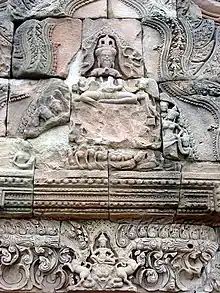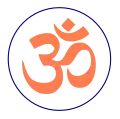Yogeshvara (Sanskrit: योगेश्वर, romanized: Yogeśvara, lit. 'Lord of Yoga') is a Sanskrit epithet employed in Hinduism.[1] The term Yogeshvara is a portmanteau of yoga and ishvara, meaning 'Lord of Yoga', 'Lord of Yogis', or 'God of Yoga'. The term is primarily employed to address the deities Shiva and Krishna.[2][3][4]

Shiva as Yogeshvara, Phnom Rung.
Hinduism
The term is an epithet of Krishna in Vaishnavism, who is also known as Parameshvara, the supreme god.[5][6][7]
Yogeshvara is a main deity in the Swadhyaya Movement, along with Shiva, Ganesha, and Parvati.
References
- ↑ www.wisdomlib.org (2017-09-21). "Yogeshvara, Yogeśvara, Yoga-ishvara: 19 definitions". www.wisdomlib.org. Retrieved 2022-11-21.
- ↑ T.N. Sethumadhavan (26 March 2015). Srimad Bhagavad Gita: A User'S Manual for Every Day Living. Partridge Publishing. p. 339. ISBN 978-1482846096.
- ↑ Swami Sivananda (1964). Sri Krishna. Bharatiya Vidya Bhavan. p. 4.
- ↑ "Krishna the Yogeshwara". The Hindu. 12 September 2014.
- ↑ T.N. Sethumadhavan (26 March 2015). Srimad Bhagavad Gita: A User'S Manual for Every Day Living. Partridge Publishing. p. 339. ISBN 978-1482846096.
- ↑ Swami Sivananda (1964). Sri Krishna. Bharatiya Vidya Bhavan. p. 4.
- ↑ "Krishna the Yogeshwara". The Hindu. 12 September 2014.
This article is issued from Wikipedia. The text is licensed under Creative Commons - Attribution - Sharealike. Additional terms may apply for the media files.
